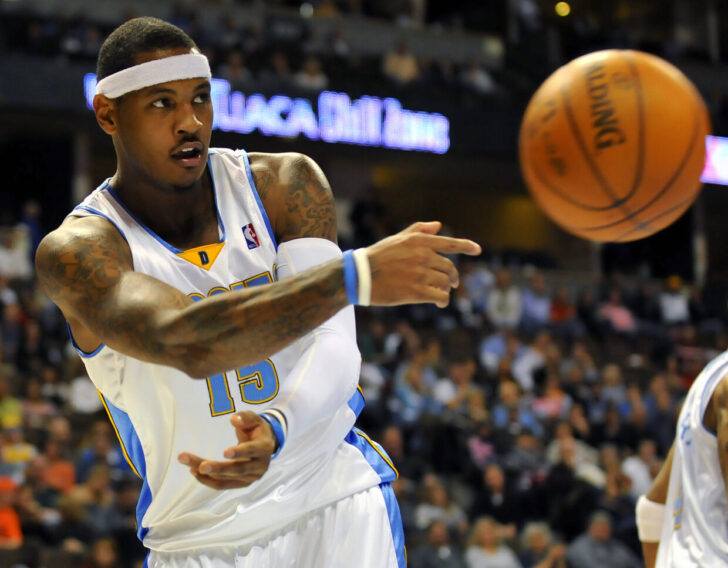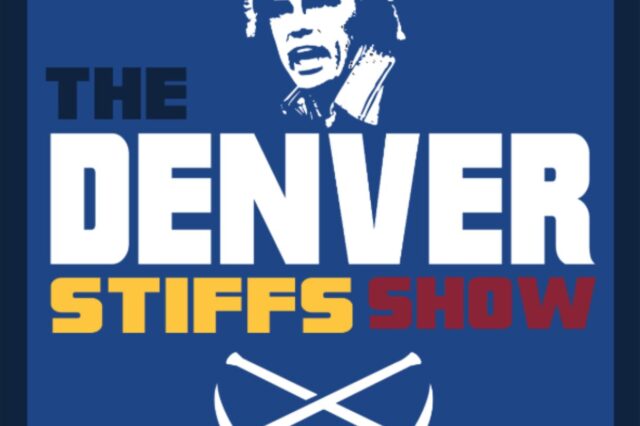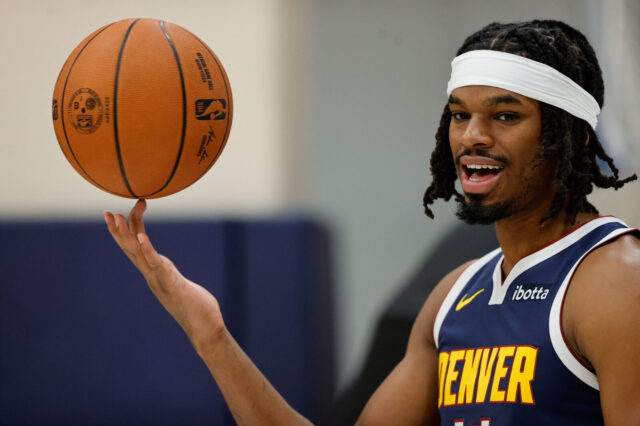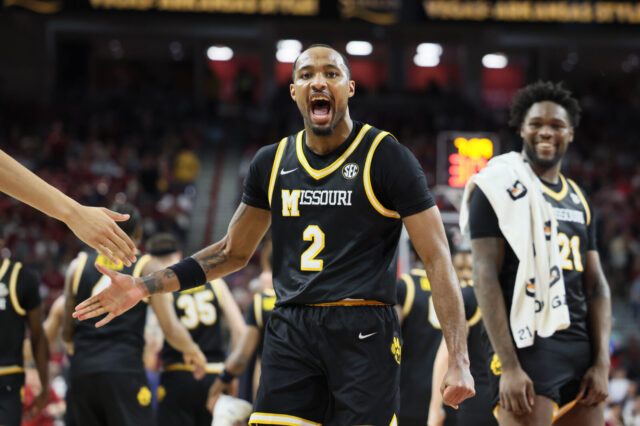The 2002-03 Denver Nuggets opened the season with a starting five of James Posey, Chris Whitney, Donnell Harvey, Mark Blount, and Ryan Bowen. They lost their first game in Minnesota 83-77. They’d lose 64 more times before the season was over, tying the Cleveland Cavaliers for the worst record in the NBA. Tom Hammonds wasn’t there to harm the lottery odds during the closing stretch (he’d join the Timberwolves for the 97-98 season and finish his career there in 2001.) They ended on an eight game losing streak.
For the lottery drawing in May, the Nuggets and the Cavs both had a 22.5 percent chance of landing the top pick. Incredibly, the Nuggets fell to number three, with the Memphis Grizzlies and their six percent odds landing second (the pick was protected only if it landed number one overall and therefore went to the Pistons as part of a trade), and the Cavs ended up with the first overall pick. It remains true twenty years later that the Nuggets are the only team in the league never to have their position improve in the lottery, and also the only team never to draft first or second. In 2003, they experienced both of these misfortunes at the same time, and once again missed the chance to draft a greatly hyped, consensus number one prospect in LeBron James. This time, though, they didn’t end up stuck with another El Busto. Ironically enough, the Pistons had become enamored with a Serbian center (Darko Miličić), and used the second pick on him, leaving Carmelo Anthony on the board for the Nuggets.
The years that followed that draft were complicated ones for the Nuggets and their fans. We’re still arguing about Anthony’s legacy to this day. There are two prominent camps in this debate: those who say that he deserves our gratitude for resuscitating the franchise by returning it to the playoffs after a long stretch of extreme futility, versus those who say he underachieved and later forced his way out in insulting fashion. He certainly was instrumental in returning the Nuggets to the playoffs in 2004 as the number 8 seed, where they set up a pattern by losing their first round series in five games. It was the beginning of a stretch where they went to the playoffs for ten consecutive years – by the end, the only other team in the league with a better active streak was the Spurs – and they lost in the first round nine times, and five of those times they lost in five games. Anthony was the centerpiece for the first seven years of that ten-year streak.
Along the way, there were some ugly bumps in the road. Controversy erupted when a DVD from the streets of Baltimore surfaced in 2004, titled “Stop Snitching!” It features some drug dealers threatening retribution for anyone who informs the authorities of their crimes, and Anthony briefly appears in it. He disavowed it, but damage was done to his reputation, and I think to the city’s feelings about the team. There was also a DUI arrest in April of 2008, just a few days before the Nuggets faced the hated Lakers in the first round of the playoffs. But these off-court incidents were not especially severe as compared to the kinds of things that happen with professional athletes in general. The greater disappointments resulted from the fortunes of the team. At the beginning of the Carmelo Anthony years, there had only been two trips to the Western Conference Finals in the history of the franchise, and they’d lost them both – but something about being a Denver sports fan had changed profoundly starting in 1998. The Broncos had finally won the Super Bowl. In fact, they’d won it back-to-back, in 1998 and 1999. For the Nuggets to keep going to the playoffs and losing in the first round over and over was probably even less satisfying to Denverites than it would have been before those Lombardi trophies came along.
Of course, the blame for all of that playoff futility doesn’t belong solely to Anthony. George Karl was brought in as head coach halfway through the 2004-05 season. The team had been struggling badly to start the season, with a 17-25 record after 42 games. Karl righted the ship and the team went 32-8 in the last 40 games, and entered the playoffs as the 7 seed, facing off against the Spurs in the first round. They won the first game of that series, providing a fleeting moment of hope, before losing the next four to Tim Duncan and company.
For the 2005-06 season, the Nuggets won the hollow honor of being Northwest Division champs. That earned them a number 3 seed in the playoffs, but the way the brackets were set up at the time meant that they still had to open the playoffs on the road against the 6 seed, the LA Clippers, who were making a rare postseason appearance during their years of being owned by Donald Sterling. The Clippers had done some tanking at the end of the season in order to draw the Nuggets as their first round opponent, and it paid off for them. They beat the Nuggets 4-1, the first playoff series victory ever for the Los Angeles Clippers (the franchise had last won a playoff series when they were the Buffalo Braves in 1976).
Early the following season, a big NuggLife incident occurred at Madison Square Garden as the Nuggets were visiting the Knicks, coached by Isiah Thomas. The Nuggets were winning the game handily late in the 4th quarter, but Karl left the starters in, even after Thomas had waived the white flag and emptied his bench. Nuggets guard J.R. Smith got absolutely hammered on a fast break by Knicks reserve Mardy Collins (some speculated that Thomas encouraged this), and a brawl ensued, resulting in the suspension of 10 players for a combined total of 47 games. This was just a couple of years after the “Malice at the Palace,” the Indiana Pacers/Detroit Pistons game that saw brawling go all the way into the stands, so the league was intent on handing out a severe punishment. Carmelo Anthony had run down the full length of the court to punch Collins in the face before backpedaling to the Nuggets bench, and was suspended for 15 games. His reputation suffered further damage. The team was 14-9 at that point, a decent start, but 15 games without the star small forward threatened to kill any playoff chances. To save the season, a big, splashy trade was made to acquire all-star guard Allen Iverson from the 76ers.
I still remember when I learned about the trade. A co-worker and I were discussing basketball, and upon learning I was a Nuggets fan, he asked me “Did you hear who they just got?” I hadn’t. “Iverson!” he said, with this mixture of disbelief and what I took to be sympathy. I didn’t know how to feel. Sure, he was an All-Star many times over, and even got the Sixers to the Finals one year. But my perception of him was that he was a selfish and undisciplined player, whether that was fair or not. His “talkin’ about practice” rant was legendary, but not in a way that made me happy to have him on my team.
Once Anthony returned from his suspension, he and Iverson combined to score a lot of points. The Nuggets finished the season 45-37, and entered the playoffs as the 6 seed, facing, once again, Tim Duncan and the Spurs. Just as in 2005, the Nuggets provided another fleeting moment of hope by winning the first game of the series, before losing the next four games. The Spurs would go on to sweep LeBron James and the Cavaliers in the Finals, but there was another notable NuggLife event in the first round: the upstart Golden State Warriors, led by Baron Davis, faced off as the 8 seed versus the 1 seed Dallas Mavericks, who’d won 67 regular season games. Just a few years before, probably in a search for more revenue, the league had expanded the first round of the playoffs from best-of-five to best-of-seven, and the Warriors shocked everyone by beating the Mavericks in 6 games. The Nuggets’ most notable achievement as an NBA franchise, the first 8 seed to win a playoff series, had been somewhat eclipsed by the Warriors, who became the first 8 seed to win a playoff series in a best-of-seven format. (And for that matter, back in 1999, the New York Knicks were the 8 seed in the Eastern Conference, and they made it all the way to the Finals before losing to – checks notes – Tim Duncan and the Spurs.)
Hopes were high for the following season – Iverson, Anthony, and the rest of the roster would have a full training camp together, and be ready to hit the ground running right away. They did end up winning 50 games, and finished 2nd in the league in scoring. Unfortunately, the Western Conference was extraordinarily competitive that season, so 50-32 got them the 8 seed. And they finished 29th in the league for points allowed. It seemed like the full training camp hadn’t particularly helped. The hated Lakers swept them in the first round, and afterwards, Kobe Bryant remarked on how scarily stacked with talent that Nuggets roster was – Iverson, Anthony, Marcus Camby, Kenyon Martin – but they didn’t seem to play together as a team very well.
A significant shakeup was just around the corner.




